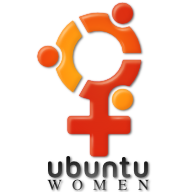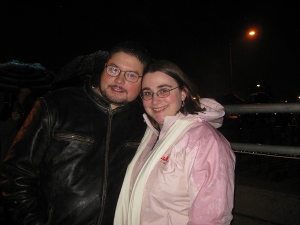Yes, I’m trying to set a record for latest UDS wrap-up post! Finally, here’s the follow-up to my last post.
UDS Day 4
– Encouraging A Diverse Community –
This was a really interesting session as it focused less on tackling the diversity issue directly and instead focused on getting folks involved in general. Amber Graner drew a picture of a ladder and a lattice to describe contributing to Ubuntu. The point? There isn’t a “top” goal to reach when it comes to contributions. Contributors can start at any point and move to any other point in the project. You can start in your LoCo team drift into Development and end up spending most of your time in the Artwork team – all these contributions are important, none valued higher than others within the community. By cultivating this community where all kinds of contributions are highly valued and encouraging all kinds of people to contribute, the hope is that diversity will come.


– Team Leadership Workshop –
This ended up being a really great brainstorming session with several leaders within the community. A couple of lists where generated regarding leadership within Ubuntu, but which extended into leadership everywhere. The topics covered where signs of a good leader, and the challenges that face leaders. The usual staples of good leadership where addressed (trustworthy, good communication skills, having purpose, ability to delegate), but also a couple that were less obvious: having had an influential mentor/role model in the past and being aware of burnout (as described by Jono Bacon here, or nicely outlined by Thomas Thurman here). As far as challenges go, there was a contentious discussion regarding “Protecting people working for/with you from higher level cruft” which led to concerns about transparency, at what point do you take leadership problems within a community behind closed doors? At which point does public squabbling amongst leaders and members of a project start harming the project more than full transparency helps? It’s something that’s come up with a project I’ve been working on, and I think the answer really depends on the community, with a tendency to lean toward transparency whenever possible.
– Texas Team –
At noon I met up with several folks from the Ubuntu Texas team who drove out to meet up and dicuss the future of the team. I attended in my capacity as a US Teams mentor to hekp things along, and it was a pleasure to meet up with some locals while I was there in Dallas. The team made great progress at the meeting that they will share and discuss with folks who were unable to attend and even selected a new team contact! I am hopeful that future meetings on IRC where geography is less of a problem can be just as fruitful.
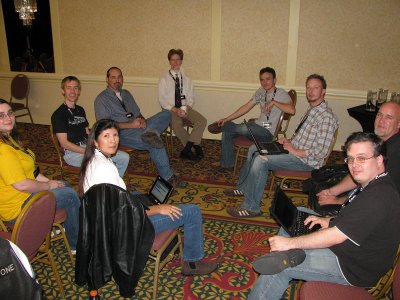 Texas Team, photo from Daniel Stone
Texas Team, photo from Daniel Stone
– Lucid Governance Changes Roadmap –
We really wanted to knock out all the doubts the community had regarding governance within Ubuntu. Having grown so organically it’s come to our attention that some of the procedures weren’t as transparent as we would have liked, lots of sessions on this subject really helped us identify and work toward ironing these out.
– Organised Writing for Ubuntu Learning –
Martin Owens and I led this Learning Team session where we primarily workes to introduce attendees to the project and outline some steps forward. This project is quite dear to me, and while I don’t think a lot was actively accomplished in this session itself, Martin’s aggressive push of this project throughout the week and demos of his new gui application to log into launchpad and configure bzr with a few clicks did great things for the project. Onward and upward!
– Ubuntu Governance –
More governance! Continuing discussions from earlier.
After the sessions wrapped up 7 of us piled into an SUV limo to head out to the firing range! It was the second trip Ubuntu folks took to the range that week, the first of which I missed due to not arriving in Dallas until late Monday evening. I got to shoot a gun for the first time in my life! A glock… something, it was black.

After the shooting range we walked over to a local sushi place for dinner before heading back to the hotel.
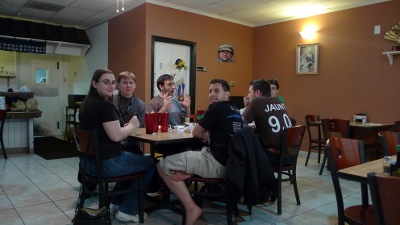 Photo from Timo Jyrinki
Photo from Timo Jyrinki
UDS Day 5
– IRC Council Lucid Plans (3rd session) –
Do we really need 3 IRC meetings? As I mentioned in my last post, lots of progress was made! And the fruits of this progress have already started to come about, with the recent Renewed call for nominations for the IRC Council to dig deeper into the IRC community for candidates.
– Ubuntu LoCo Leadership Series –
Amber Graner led this session with her fantastic plans for a comprehensive leadership document. There was such overwhelming support for her document outline that the discussion immediately went into how we’d go about collaboratively editing and distributing it. The session ended on distributing the leadership document via the “How to Spread Ubuntu” section of the Ubuntu Community Learning Project.
– LoCo Member Recruitment Workshop –
Grant Bowman led this great session where I learned about the Ubuntu Hour idea from Fabián RodrÃguez, what I fun idea! *starts scheming*
– Unify Council Restaffing Process –
Honestly? We were all a bit giggly at this point. The Community Council had already loosely put together some ideas for unifying the restaffing process where predictable timelines are set for elections and appointments – it’s still on my ToDo list to put this into a pretty form for sharing. I should do that. The rest of the session was spent doing a wrap-up of the Community Track that week to tie off loose ends.
– Next steps for the Ubuntu Women project (3rd session) –
In this last session of we solidified our Lucid cycle roadmap.
And UDS is over! Well… except for the evening BBQ and Allstars entertainment. Fun times were had by all, as you can see by Chris Crisafulli’s party photos can attest to, including this gem:
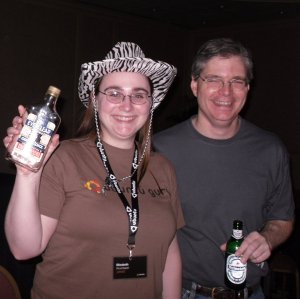
Oh bother, here I am with drinks and guns all in a single post! I blame Texas (besides, ice skating was still more dangerous!).



